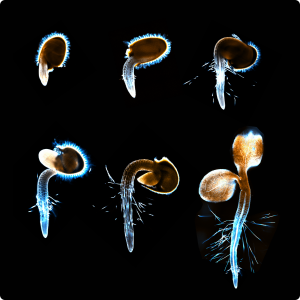Unlike most animals, plants are not motile and therefore have to cope with their immediate environment throughout their life cycle. Thus, evolution has endowed plants with a remarkable range of developmental plasticity. For instance, plant cells possess an amazing regeneration potential that enables the formation of a whole plant from a single somatic cell, bypassing the requirement for a fertilization event and zygote formation. Another central feature of plant development is the post-embryonic formation of the plant body. In animals, all organs are formed during embryogenesis and elaborated during the juvenile stage. By contrast, plant embryogenesis results in the formation of a miniature plant, the seedling, which possesses discrete areas of stem cells. These stem cells will form the majority of the plant organs post-embryonically, in a reiterative fashion and in response to environmental stimuli. Ultimately, the stem cells have the potential to form any organ and any cell type found in the adult organism. This build up of organs continues until the plant dies and can last hundreds of years in long-lived plants, like certain trees. Thus the control of plant growth and the elaboration of plant form are central to plant development.
Our research revolves around the genetic control of plant growth and development, and the underlying molecular mechanisms. We focus on genes that are responsible for modifying quantitative aspects of plant growth and morphology, which possibly could also have a role in the evolution of plant form and physiology. Our favorite experimental organisms are the dicotyledon model Arabidopsis thaliana, and the monocotyledon model, Brachypodium distachyon.
Find a brief overview of our research projects, from natural genetic variation to developmental cell biology, in the submenu of this page!
